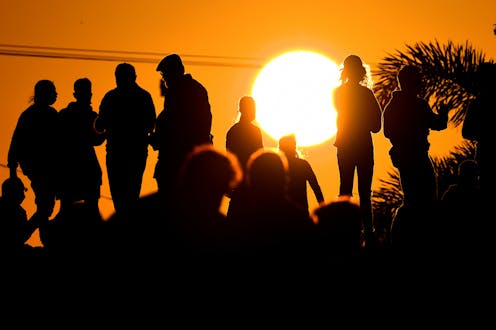young people from regional areas face a big stigma if they don't move to the city
- Written by Candice Boyd, ARC DECRA Fellow in Human Geography, The University of Melbourne

Young people moving to the city has been a serious dilemma for regional Australian communities for decades.
Between 2011 and 2016, about 180,000[1] regional Australians between 20 and 35 years old moved to capital cities, although around 30% of them eventually returned to a regional area.
The reasons for what researchers term “youth outmigration” are varied, from seeking education and employment opportunities, to the lure of an urban lifestyle. This can have a negative impact on the communities left behind, including local workforce ageing, impact on the local economy and availability of services.
But what about the young people who don’t go?
New research
As part of a three-year study of this phenomenon, 50 young people were interviewed from three regional areas of Australia — Griffith in NSW, Port Hedland in Western Australia, and Port Lincoln in South Australia. Participants ranged in age from 18 to 34.
The study aimed to better understand the reasons why young people leave these areas, choose to stay in their hometowns, or return to their hometowns having left for a period of time.
The three locations were chosen because each is experiencing net youth outmigration despite increasing economic investment, online study options, and business sponsorship schemes such as Regional Development Australia’s Grow Our Own[2]. Partnerships between industry and government like this are part of an effort to keep young people in their regional areas.
Young people explain why they stay
Interviews suggest the reasons Australian young people choose to stay or go had more to do with emotions and identity than money, education, or job opportunities. For example, young people who stay reported feeling safe and comfortable in the country:
I think country towns, they have more security, and more like a family feel. I think there’s a level of intimacy in the relationships you develop in the community.
Others talked about feeling unsafe and stressed in cities:
I was not confident to go to the city and live by myself. I am a big fan of wider populations, not the city. I would go down for a holiday and to go shopping, but I am not a big fan of crowds.
Others again said they wanted peace and stability:
I like my peace and quiet, and I also like to have good space around me. I don’t like hearing cars all the time. I am not big on change.
Young people also described their country or regional lifestyle as a positive thing, worth staying for:
All my life I have always grown up seeing old people having a yard, and they have their roses and their chickens or have their dogs and their cats, and they seem more content, like they have more of a purpose in the country — they can grow their own vegetables here.
The stigma of staying
But despite wanting to stay, this decision was not straightforward. Interviewees spoke of a cultural expectation, starting in childhood, that when you reach adolescence, you needed to go to “the big smoke” to go to university:
I think the pressure [to leave] probably came from the school sector more so than family […] when I think back, I think the schooling sector put the weighting on going to university.
This was reinforced by others in the community, who expected the younger people to leave.
If you were just waiting at the train station or something like that, they’d say “when are you leaving?” Everyone just assumes that you will.
Young people reported the pressure to leave came from schoolteachers who had had a positive experience of city life, or from parents who wanted their children to have “a better life”.
When I got the [local] job, I was too scared to tell my parents. They really wanted me to go to uni.
Interviewees spoke of how staying in their home areas was equated with failure.
It’s almost like you have to leave, if you’re going to be successful.
A small shift could make a big difference
What if instead of asking a regional young person “when are you leaving?”, we asked “what are your plans?”?
What difference might that small shift in emphasis make, so regional youth feel free to make a home wherever they feel safe and comfortable, and not according to prior assumptions and expectations?
Policymakers and regional community leaders should understand there can be complex emotional reasons behind young people’s migration decisions, and that they can feel pressured to leave or judged for staying.
Turning the tide of young people leaving their regional area might be as much about shifting community attitudes and expectations as it is about creating local employment opportunities.
References
- ^ about 180,000 (www.regionalaustralia.org.au)
- ^ Grow Our Own (growourown.org.au)

















